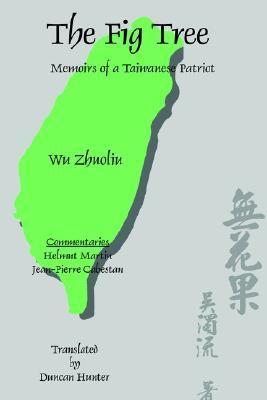
| Title | : | The Fig Tree: Memoirs of a Taiwanese Patriot |
| Author | : | |
| Rating | : | |
| ISBN | : | 1403321507 |
| ISBN-10 | : | 9781403321503 |
| Language | : | English |
| Format Type | : | Paperback |
| Number of Pages | : | 328 |
| Publication | : | Published August 20, 2002 |
The Fig Tree: Memoirs of a Taiwanese Patriot Reviews
-

This is a personal memoir of a Taiwanese journalist and novelist, who grew up when Taiwan was a colony of Japan, taught school in Taiwan, had the opportunity to work in Japanese controlled Nanjing, and later began working as a journalist. He wrote at least one novel under Japanese rule, “Orphan of Asia.” In that fictional novel he reflects many of the tensions he described in this book, the resistance by Taiwanese to Japanese rule, the longing for becoming reunited with “motherland” of China, and the disillusionment of the China he experienced.
In this book he also wrote about the 228 incident/massacre (Feb 28, 1947) when China was governing Taiwan, and the huge lost opportunity for China to win the hearts of the Taiwanese people, who were enthusiastic for being the model Chinese province that could reflect the three principles set down by Sun Yat Sen. The three principles of the people are summarized as nationalism, democracy, and the livelihood of the people (see reference below). However, the Chinese administrators and soldiers saw the Taiwanese as “enemies”, having been colonized by the Japanese. Moreover, the Chinese administrators and soldiers facilitated corruption and projected the sense that they were conquerors and were owed anything they wanted.
This memoir nicely portrays the dilemma and evolution of thinking of many Taiwanese of no longer thinking of themselves as a part of China.
The author has a disarming style of writing, laying bare his self-perceived weaknesses to resisting both Japanese and Chinese, demonstrating a strong moral backbone, and at times portraying a person who opening defends ideals, even at the cost of personal loss.
The book also offers penetrating insights into the times. For example, when the Japanese in Taiwan were reduced to second class citizens after the loss, he states that “Only those who have lived through it can know the utter misery that war inflicts on the defeated. Its effects cannot be understood vicariously through explanation or description.” Observations like this one and others transcend the specific events.
He has a chapter titled “The Fig Tree”, which covers part of his time in China and his return to Japanese controlled Taiwan. With his disillusionment of China and knowing the inequity in Taiwan between Japanese and Taiwanese, he had to decide how we would express his feelings. His approach seems to have been to “be like the fig tree, blooming only where it cannot be seen.” It is thus how he wrote his novel “Orphan of Asia”, fearing that if the Japanese read the pages, he would lose his life.
This edition has a nice set of notes about people or terms in bold in the book. The translator seems to have taken a hand at some editing of the original Chinese version into this edition.
FB: This is a solid contribution to understanding the transformation of Taiwanese thinking from colonialism or reunion with China to a self-aware, self-governed people, full of insights, and examples of feelings, through his writing, poems, and news articles.
Wu Zhuoliu
https://en.wikipedia.org/wiki/Wu_Chuo...
Three Principles of the People:
https://en.wikipedia.org/wiki/Three_P....)


![Orphan of Asia by Wu, Zhuoliu. (Columbia University Press,2008) [Paperback]](https://i.gr-assets.com/images/S/compressed.photo.goodreads.com/books/1698719331i/164858897.jpg)